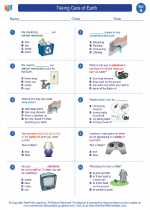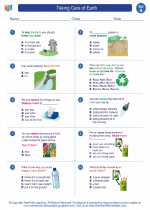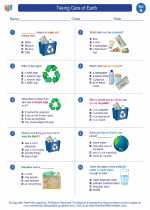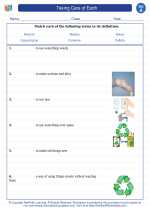Taking Care of Earth -> evaporation
Evaporation
Evaporation is the process in which a liquid turns into a gas. This occurs when the molecules in the liquid gain enough energy to break free from the liquid's surface and escape into the atmosphere as vapor. The most familiar example of evaporation is when water evaporates from the surface of a pond or a wet piece of clothing left outside to dry.
Factors affecting evaporation
Several factors can affect the rate of evaporation, including:
- Temperature: Higher temperatures generally lead to faster evaporation, as the increased heat provides more energy to the liquid molecules, allowing them to escape into the air more easily.
- Surface Area: A larger surface area of the liquid exposed to the air can increase the rate of evaporation, as more molecules have the opportunity to escape into the atmosphere.
- Humidity: Lower humidity levels in the air can enhance evaporation, as the dry air can absorb more water vapor, creating a steeper concentration gradient and encouraging more rapid evaporation.
- Wind: A constant flow of air can carry away the water vapor molecules from the liquid's surface, promoting faster evaporation.
Applications of evaporation
Evaporation has several important applications in daily life and various industries. Some of these include:
- Drying clothes: Hanging wet clothes outside leads to the evaporation of water, causing the clothes to dry.
- Salt production: Evaporation is used to extract salt from seawater, leaving behind the salt as the water evaporates.
- Distillation: The process of distillation involves evaporation of a liquid followed by condensation of the vapor to separate substances based on their different boiling points.
Study Guide
To better understand evaporation, consider the following questions:
- What is evaporation, and how does it differ from boiling?
- What are the factors that affect the rate of evaporation?
- Provide examples of how evaporation is used in daily life and various industries.
- What is the role of evaporation in the water cycle?
Additionally, you can perform simple experiments to observe and understand the process of evaporation, such as placing a bowl of water in different environments with varying temperatures and humidity levels and noting the rate of evaporation.
Understanding evaporation is essential for comprehending various natural phenomena and human-made processes, making it a crucial topic in the study of science and everyday life.
[Evaporation] Related Worksheets and Study Guides:
.◂Science Worksheets and Study Guides First Grade. Taking Care of Earth

 Worksheet/Answer key
Worksheet/Answer key
 Worksheet/Answer key
Worksheet/Answer key
 Worksheet/Answer key
Worksheet/Answer key
 Vocabulary/Answer key
Vocabulary/Answer key
 Vocabulary/Answer key
Vocabulary/Answer key
